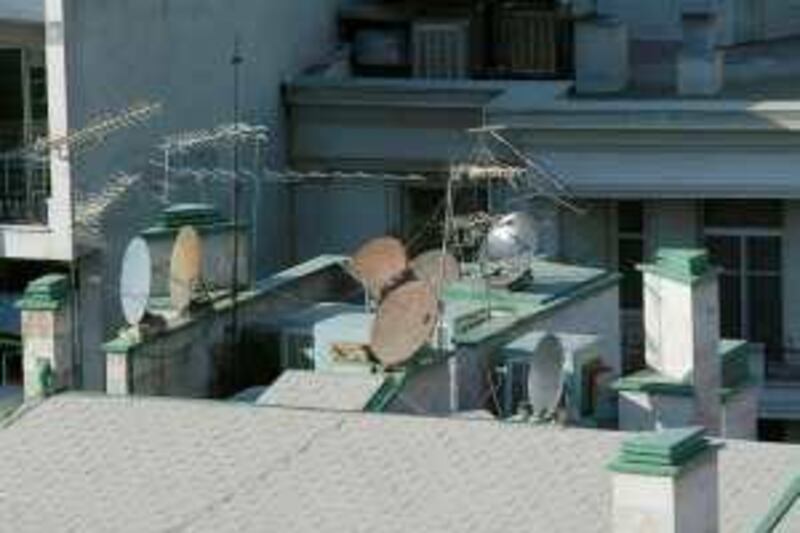Iran will come under robust pressure from the European Union today to stop jamming satellites transmitting the Farsi-language channels of major international broadcasters and censoring the internet. Britain, France and Germany, supported by Baroness Catherine Ashton, the EU's new foreign policy chief, are leading the charge to condemn Tehran's "unacceptable actions". At a meeting of EU foreign ministers in Brussels today, the three countries will seek more than a rhetorical rap across Iran's knuckles. They will urge fellow members of the 27-nation bloc to "define and apply strong measures that may be implemented" if Tehran does not immediately end "this electronic interference".
Western governments - and the Iranian opposition - consider as vital the free flow of impartial news into Iran following the regime's crackdown on dissenting local media after last June's disputed presidential elections. Scores of Iranian journalists and bloggers have been jailed in recent months. A draft statement by the foreign ministers of Britain, Germany and France said that since December Iran regularly has jammed satellite broadcasts of foreign television and radio stations, among them leading European channels such as the BBC's Persian television service (PTV) and Deutsche Welle.
Iran's manifest objective has been to prevent its people "from freely exercising their right to information", the statement says. The Iranian regime has accused western broadcasters - supposedly at the behest of their governments' intelligence services - of trying to help foment a "velvet revolution" by the Iranian opposition. The jamming culminated on February 11 when Iran marked the anniversary of its 1979 Islamic Revolution, the EU draft statement says. Tehran's interference "affected nearly 70 foreign radio and television services" being retransmitted via a satellite owned by Paris-based Eutelsat, Europe's leading operator of satellite-based services
Iran, seemingly, already is responding to the heat. The VOA's Persian Service and Deutsche Welle have been transmitting without disruption on Eutelsat's popular Hot Bird satellite since the beginning of March, Eutelsat says. PTV began transmitting again on Hot Bird last Friday, after spending four months on another Eutelsat transponder that was less popular with Iranian viewers because it received far fewer channels.
European pressure aside, Iran analysts say Tehran's decision to stop satellite jamming signalled the regime's confidence that it has the upper hand over the opposition since it snuffed out with relative ease planned mass street protests on February 11. Industry expects, however, warned that the problem is far from resolved. "Say there's another huge demonstration in a few weeks - as soon as PTV or VOA starting covering it they could be jammed again," said a London-based specialist, who declined to be named.
Western broadcasters say that besides affecting their Farsi-language services, jamming by Iran could cause havoc with international satellite operations. "If the Iranians are allowed to jam any channel and get away with it, others in other countries will begin to do the same. It's a recipe for chaos," Behrouz Afagh, the BBC World Service's director of the Asia and Pacific region, said in an interview.
Jamming violates the agreements of International Telecommunications Union, to which Iran is a party. But the Geneva-based UN body, which is pledged to support international broadcasting freedom, has no real enforcement power. Eutelsat says it has repeatedly pressed the French and international telecommunications regulatory bodies to denounce jamming by Iran. Additionally, Eutelsat says it has worked hard to help customers such as PTV to have "interference-free signal broadcasting" on its other satellites, such as W3A.
Besides, Eutelsat argues, its hands are largely tied by legal contracts. The decision to remove PTV from Hot Bird, for instance, was taken by GlobeCast, a France Telecom subsidiary, which leases bandwith from Eutelsat, said Vanessa O'Connor, Eutelsat's head of corporate communications. Similarly, although Iran's state broadcaster uses Eutelsat satellites, IRIB's contract is with a British-based company, Ms O'Connor added in an interview from Paris.
Sceptics may view as more than mere coincidence GlobeCast's decision to allow PTV back on Hot Bird - with Eutelsat's blessing - just days before today's EU meeting. PTV had been pressing GlobeCast to do so for four months. PTV will keep broadcasting on Eutelsat's W3A as a safety net. But it was delighted by Friday's breakthrough. "This is great news. We are back on Hot Bird," Sadeq Saba, the head of the BBC's Persian service, said in an interview.
mtheodoulou@thenational.ae





